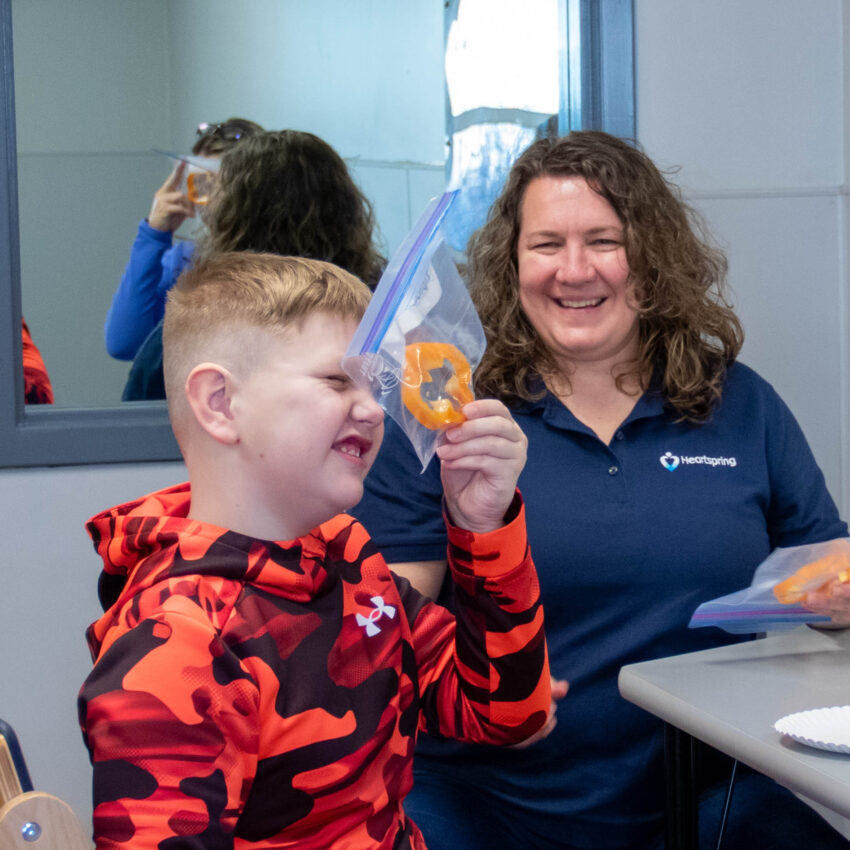Pediatric Therapies
Feeding Therapy
Make mealtimes less stressful for the whole family.

In our dedicated feeding therapy space, food takes the center stage as the most exciting thing in the room. We encourage families to learn alongside their child, where there's always a seat at the table.
What is Feeding Therapy?
Feeding therapy helps children who struggle with eating, whether due to sensory aversions, motor challenges, or medical conditions, develop safe, functional, and more enjoyable mealtime strategies and habits.
Food Textures
We help children gradually tolerate and manage different food textures, supporting safer chewing and swallowing and broadening their comfort with a variety of foods.
Trying New Foods
Through gentle exposure and play-based strategies, therapy encourages children to explore and accept new foods at their own pace without pressure or stress.
Integrating Food Groups
We guide children in expanding their diet to include a balanced mix of fruits, vegetables, proteins, and grains, supporting better nutrition and long-term health.
Oral Motor Skills Related to Eating
Therapy targets the strength and coordination of muscles used for chewing, sucking, and swallowing, helping your child eat more efficiently and safely.
Sensory Regulation During Mealtime
Children sensitive to smells, textures, or the act of eating itself learn strategies to help them stay calm and comfortable at the table.
Specialized Therapeutic Strategies
Our multidisciplinary feeding therapists, specially trained in proven, research-based methods, provide play-based, tailored approaches to meet children’s unique feeding challenges.
Sequential Oral Sensory (SOS) Approach
This evidence-based method helps children explore food through play and sensory steps, building comfort and trust before they’re expected to taste or eat.
Play-Based Individual and Group Therapy
Feeding therapy can be one-on-one or in small groups, using play and peer modeling to make food exploration feel fun, social, and less intimidating.
Beckman Oral Motor Assessments and Protocols
Our trained therapists use this structured approach to assess and improve oral motor function, targeting specific movements needed for safe and effective feeding.
Could These Feeding Diagnoses Apply to Your Child?
Pediatric Feeding Disorder
For children with persistent difficulties related to eating, nutrition, or mealtime behavior, feeding therapy addresses underlying causes and builds sustainable skills for better life-long relationships with food.
Dysphagia, Oral Phase
We work with children who struggle with the oral phase of swallowing, helping them manage food safely in their mouth and preparing them for effective, coordinated swallowing.
Our Feeding Therapists
Our multidisciplinary feeding therapists bring expertise from their fields, working together to support your child’s growth, comfort, and success at mealtimes.

Nikki Bina, MS, CCC-SLP
Interdisciplinary Clinical Director

Emily Anderson, OTR/L
Occupational Therapist

Carolina Gonzalez, MS, CCC-SLP
Bilingual Speech-Language Pathologist

Katie Patton, MS, CCC-SLP
Speech-Language Pathologist

Leah Prater, MA, CCC-SLP
Speech-Language Pathologist
Request a Feeding Therapy Appointment
Pediatric feeding therapy empowers children to develop better relationships with food by addressing their sensory and emotional barriers to eating — one step at a time.
More services

Otto's Feeding Therapy Success
“Preparing food and feeding him meals became a burden. I knew for him to be healthy and strong that he needed help.”
Feeding Therapy Resources





